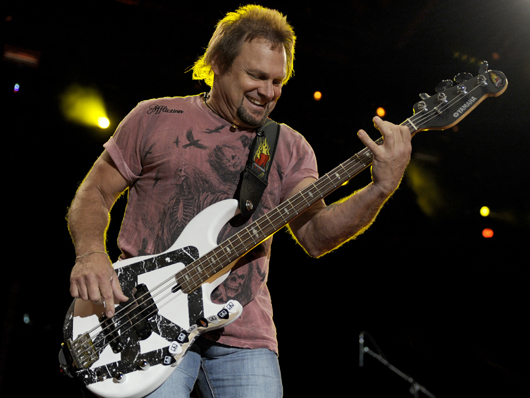
Michael Anthony chooses his six best
"Being a bass player is like being Rodney Dangerfield," says Michael Anthony. "The bottom line is, no matter how great we play, we don't get no respect!"
He laughs and adds: "But hey, I'm used to it. I've played alongside Eddie Van Halen and Joe Satriani. Really, when you're sharing the stage with dudes that amazing, who's going to look at the bass player? It's just not done!"
Until now. MusicRadar caught up with the Rock And Roll Hall Of Famer and asked him to single out the six albums that have most defined his career. And while Anthony might not get the same respect of the axe slingers he backs up, with the amount of gold and platinum that line his walls, he sure must be doing something right.
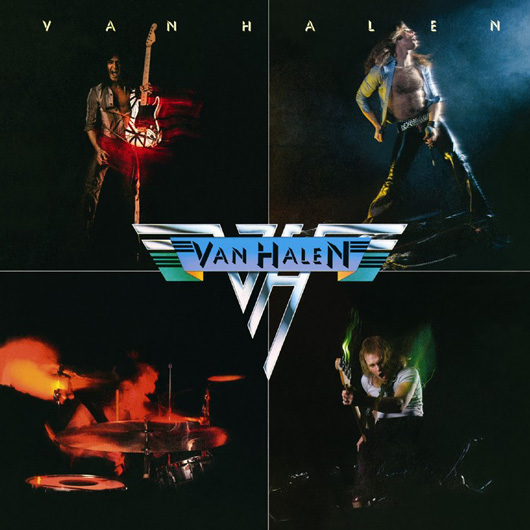
Van Halen (1978)
Eddie Van Halen, Alex Van Halen, David Lee Roth and Michael Anthony were four upstarts from Pasadena when Warner Brothers head Mo Ostin and in-house producer Ted Templeman caught their show at the Starwood Club in LA. Soon, employees at record stores everywhere would hear a certain hammer-on pattern over and over again...
Michael Anthony says:
“Even though we had gigged steadily for a couple of years, we didn’t have a ton of material, so we basically just took our live show and all the songs we knew and went for it. The whole album took a couple of weeks.
“Ted Templeman wanted to make a big, powerful guitar record, and he had all he needed in what Eddie was doing. He fell in love with Ed’s playing. Eruption wasn’t written out or anything. Eddie was just noodling around before a session, but once Ted heard it he said, ’Stop everything. Ed, we’re rolling tape on that.’
“As confident and full of ourselves as we came across on that record, the truth is, we were all pretty scared. I remember we put our headphones on and kind of looked at each other like, ‘Wow, we’re really doing this. Hope we don’t mess up!'”
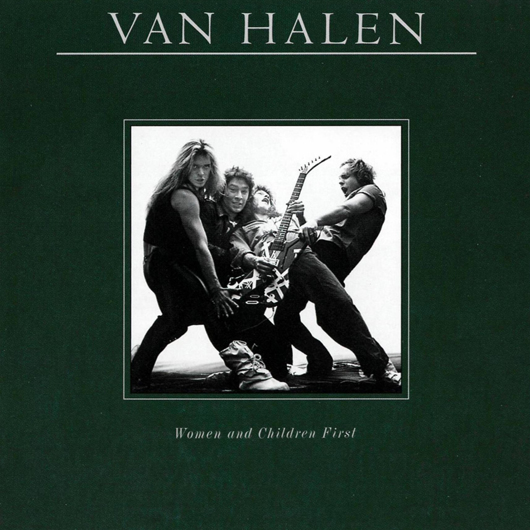
Women And Children First (1980)
Within two short years, VH were the biggest hard rock band around, and Eddie Van Halen had established himself as a guitar superstar - and damn near a living legend. On the band's third record, however, things began to change...
Michael Anthony says:
“Eddie started playing the riff to And The Cradle Will Rock on a Wurlitzer electric piano. Everybody loved it but Dave: ’No keyboards, Eddie! We’re a guitar band. Nobody wants to hear you play the piano.‘
“But Eddie was cranking it through the Marshalls and he put a flanger on it - the effect was so loud and powerful, I didn’t even think it sounded like a keyboard. Eddie won that argument, which ultimately was for the better - keyboards started to expand our sound and direction.
“As good as the album is, we raced through it. I couldn't get too tricky with my bass playing; in fact, my approach was very brutal at times. We were in such a cycle of touring, recording, touring, recording that we didn’t have a moment to catch our breaths. Maybe that’s why the album sounds so vicious - we were running as fast as we could.”
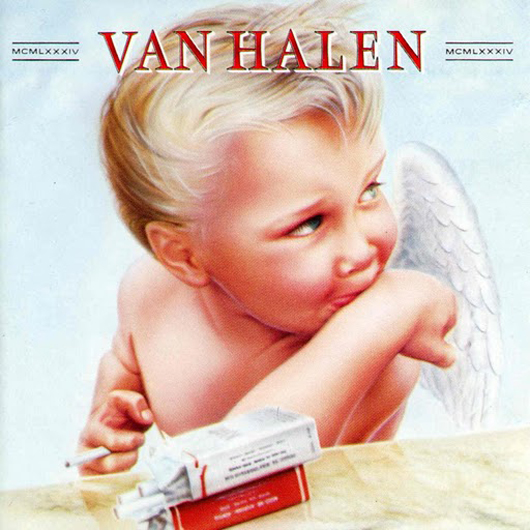
1984 (1983)
Although they were still selling out arenas and stadiums, Van Halen's 1982 album Diver Down was a haphazard affair comprised of half-finished songs and padded with cover tunes. But the group rallied brilliantly for their next effort.
Michael Anthony says:
“We never considered ourselves a singles band, so our attitude was always like, ‘whatever’ when it came to what the label wanted to put out. Our albums sold in the millions no matter what.
“But we were a little dubious when Warner Brothers said they wanted to put Jump out as a single. ‘It’s another keyboard song,' we all said. 'Hmmm, we don’t know about this...“ In the end, we said, ‘Fine, go ahead,‘ and boom! - our first No. 1 single. Amazing.
“I had a great time playing on 1984. I felt like I was growing as a player and background singer. Plus, I think the band was getting very creative. But then, right as everything went as high as it could possibly go, we hit a brick wall - hard.”
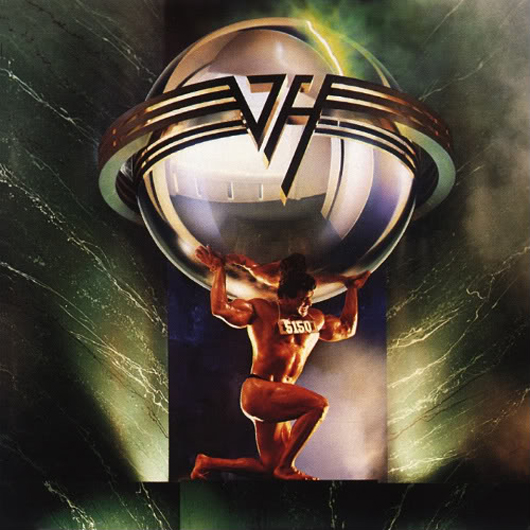
5150 (1986)
To the shock of millions of fans - to say nothing of the band - David Lee Roth abruptly quit Van Halen after their smash 1984 tour to start a solo career. The group was adrift, convinced they were over. And then the strangest thing happened...
Michael Anthony says:
“Our spirits were pretty low. ‘What the hell are we gonna do?’ We didn’t know. But thanks to Eddie’s auto mechanic, Claudio Zampolli, who suggested Eddie give Sammy Hagar a call, things turned out beautifully. Sammy came down, we jammed and the result was amazing: suddenly, Van Halen was a band again.
“As a vocalist, Sammy has wider range than Roth, so we were able to do songs like Dreams and Why Can’t This Be Love. It was great. Now we had our first No. 1 album.
“Musically, I was able to get more fluid on the bass - I didn’t have to pound and hammer as much. The songs and arrangements were more complex and varied. It was a very exciting time for us. How many people get to hit it big twice?"
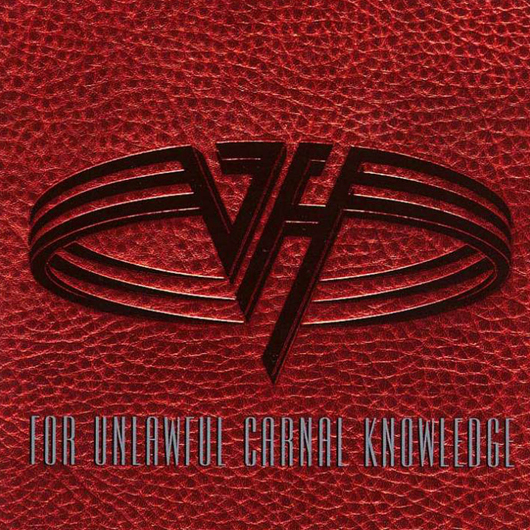
For Unlawful Carnal Knowledge (1991)
By the early '90s, 'Van Hagar,' as they were often called, were firing on all cylinders. Stunning all doubters, they were even more successful with Sammy Hagar than with David Lee Roth. And finally, a musical victory for the bass player!
Michael Anthony says:
“Thanks to Andy Johns, this was the first big bad bass record we ever had. Andy’s a bass player, and the first thing he said to me was, ’Michael, I want to really hear you for a change.’ All I could say was, 'Yes! Thank you!'
“The album had great energy to it. We had terrific songs like Poundcake and we were really cookin’. I think it’s one of our best overall.
“Alex always got such an enormous ound, and Eddie had a tonal range that really filled up the tracks. I was always kind of fighting for my spots to shine. But Andy had me bring in my big Ampeg SVT and just tear the place up. He got a killer sound, not just from me but the whole band. I can’t say enough about the guy. He helped us make one of our finest records. You could literally hear every instrument.”

Chickenfoot (2009)
Van Halen sputtered to a halt halfway into a sell-out 2004 tour, and soon after, Hagar and Anthony were out of the band. The two friends figured that was finally that. But a jam session in Las Vegas with guitar star Joe Satriani and Red Hot Chili Peppers drummer Chad Smith led to yet another band - one with a really kooky name.
Michael Anthony says:
“God, what can I say about Chickenfoot that hasn’t already been said? Sammy and I really didn't know if there was going to be another chapter in our musical lives together. Lo and behold, the third time is definitely the charm.
“Getting together with these guys was like being born again. I felt like a kid who just played his first high school dance and impressed all the pretty girls. Really, it's that cool. And the best thing is, there's no egos, no bullshit - it's just four guys going for the same thing together, the way a band should be.
“Making the record was like a dream come true. We were with Andy Johns again, and he knew exactly how we should sound. Plus, the songs were strong. Joe’s a great writer and a genius on the guitar; Sammy reached a new peak, writing-wise and as a vocalist; and Chad and I contributed lots of ideas and really worked as a team. He's an amazing drummer, very inspiring. Everybody rooted for one another; we were our own cheerleaders.
"I can’t wait to do our next album."
Joe is a freelance journalist who has, over the past few decades, interviewed hundreds of guitarists for Guitar World, Guitar Player, MusicRadar and Classic Rock. He is also a former editor of Guitar World, contributing writer for Guitar Aficionado and VP of A&R for Island Records. He’s an enthusiastic guitarist, but he’s nowhere near the likes of the people he interviews. Surprisingly, his skills are more suited to the drums. If you need a drummer for your Beatles tribute band, look him up.
